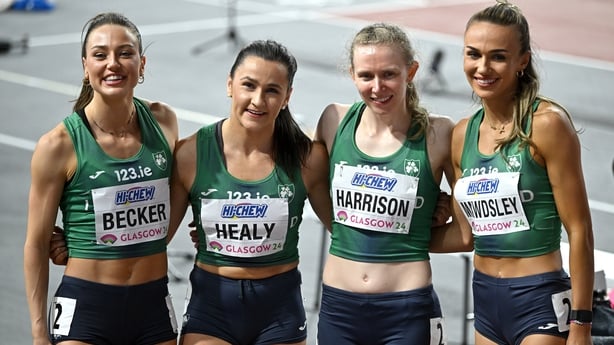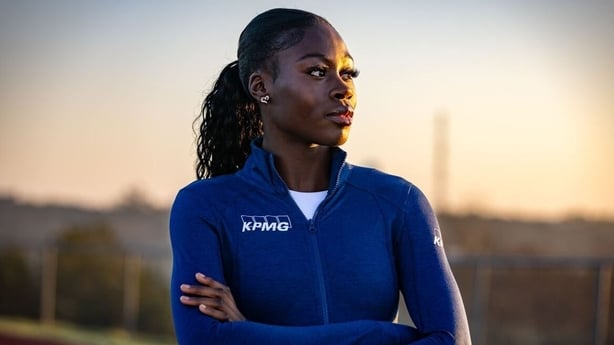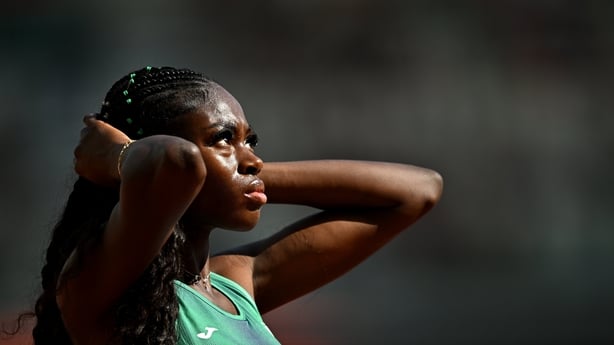With the spotlight rarely shining as bright on Irish indoor athletics, Rhasidat Adeleke was keeping tabs on the exploits of her compatriots as the women's relay 4x400m team claimed fifth at the Indoor World Championships in Glasgow.
Similar to Ciara Mageean and Andrew Coscoran, Adeleke opted against travelling to the championships to fine-tune preparations ahead of the outdoor season.
Ireland finished two and a half seconds off the bronze position, but some observers feel her presence could well have seen Irish representation on the indoor podium for the first time since Derval O’Rourke’s gold in 2006.
Does Adeleke, who was ruled out of the 4x400m team at last year's World Championships due to injury, think she could have pushed Ireland up the standings?
"Who knows? "You could say if I was there, but anything could happen. They did exactly what they were capable of. I was really proud of them," she told RTÉ Sport.
"It was amazing to see that we can really get up there to be medal contenders. We are a force to be reckoned with in the relays now.
"They have proven that over the years, it’s becoming consistent. When you see an Irish singlet (in a relay event), that’s a threat."

The 21-year-old was following the results more than watching the championships, though did see the controversial overtaking manoeuvre that saw Mawdlsey disqualified in the 400m.
"I feel that is so normal in indoor running, she shouldn’t have been disqualified," Adeleke says. "She deserved to be in the final."
For all the feel-good factor around the team, there are no regrets from the University of Texas student. The bigger picture, this year of all years, is firmly about the outdoor season.
Going to Glasgow would have impacted the training schedule and right now, she’s happy with where she is.
"It’s playing well for me. I’m going to be ready for when I need to be ready. My coach was telling me to focus on the bigger goal. We are working towards something bigger."
Her own indoor season came to a conclusion at the prestigious Millrose Games in New York last month. A second place in the 300m final saw another national record, to add to her 60m and 200m records earlier in the year.
Given where Adeleke is setting the bar, she describes it as a just "decent" season.
The second place in New York rankles, more to do with the performance than the placing. Her coach Edrick Floreal certainly didn't sugarcoat the run, describing it as "awful".
The plan was to run the first 200m in 22.9, but she was nearly a second off that and Talitha Diggs caught her to claim gold. The coach felt a lack of aggression in the opening 200m cost her dearly, and while Adeleke had only run that distance once before, it was a pacing issue at the heart of her setback.
"I went out way too slow. The 300 is hard to manoeuvre," she says.
"I went out slower in the 300 than I would in a 400. That’s not how you are supposed to run it. I didn’t execute it the way I wanted to. I was feeding off the person in front of me. I passed them quickly and thought I was going too fast, but I didn’t feel tired.
"I should have trusted myself and my training. It’s OK, you live and learn."

Floreal knows he has a gifted athlete on his hands, but has spoken about the one area that needs improving.
"You look at her races at the end, mechanically, she falls apart. Technique goes out the window, the back gets arched, she becomes flat-footed," he told Cathal Dennehy last month.
The remedy? Simply hours and hours on the track
"It’s repetition. It’s about when you are fatigued in training, being able to input those movements into those times, and then it will transfer to the race. When I’m tired in training, I’ll go back to being poor mechanically."
It’s for that reason she has a love/hate relationship with the 100m. In such a technically demanding event, there is very little margin for error.
"Most of the times I have run it, I have run all over the place."
The noise of the Olympics, as she has stated before, doesn’t consume her. It’s an opportunity that so many crave, but it’s more about the immediate schedule and the next race. From a preparation point of view, it makes things more straightforward.

"I don’t think about it too much, I try to make sure I am doing everything I can to put myself in the best position to perform."
Her race schedule isn’t set in stone just yet, but her outdoor season starts in just over three weeks’ time at the famed Texas Relays.
In May she will link up with the in-form women’s relay team – as well as the mixed 4x400m relay team - for the World Athletics Relays in The Bahamas, where Paris qualification is the prize.
The growing profile washes over her easily, aided by the feeling that she is merely "a small fish in a big pond" in American athletics. Expectations about the level she can reach are growing, but that presents little fear for the 2023 NCAA Championship winner over 400m
"I have established myself so I’m in the conversation more," she says. "I just try to look at it as a positive thing. I know it might seem scary or seem pressurised, but at the end of the day it’s only if you let it get to you and if you see it as a negative thing.
"Expectation is sometimes a good thing. People believe in you and you can do good things."
Follow the RTÉ Sport WhatsApp channel for the best news, interviews, analysis and features, as well as details of our sports coverage across all RTÉ platforms.


